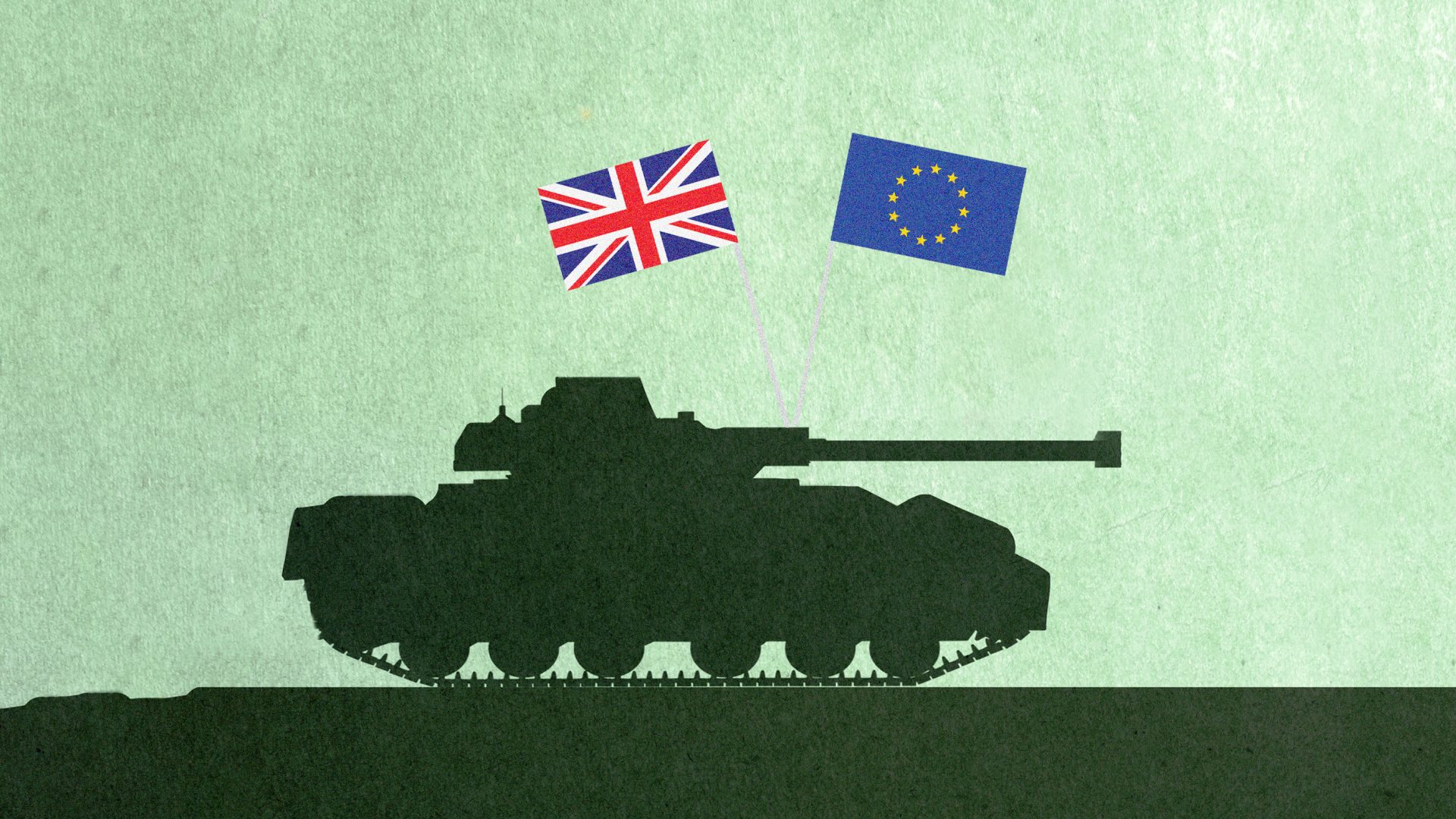Donald Trump loves to crow about his glorious achievements but he is unlikely to boast about one of real significance that looks to be coming to fruition – a Brexit reset deal between the UK and EU.
In the first weeks of his second stint in the White House, Trump has asked as many – if not more – existential questions of America’s allies as he did the first time around.
Trump 2.0 appears more willing than before to punish countries that he deems to have taken advantage of America by throwing his weight around with tariffs, threats to abandon friends and proposals to (checks notes) take over Greenland and Canada.
Europe is feeling the heat more acutely now than it did during Trump 1.0. Not only has the US president unleashed economic warfare on America’s oldest allies; he’s given the clearest indication since the end of the second world war that he would not come to our aid if a common adversary were to attack the continent.
Without the American commitment to protection, it’s undeniable that the continent is now more vulnerable than at any other point in recent memory. That’s partly our own fault for not capitalising on the peace dividend, along with underspending on security for decades. It’s also partly because governments stuck their heads in the sand and denied the terrifying reality that countries like Russia, China, North Korea and Iran were bolstering their own militaries and geopolitical ambitions.
For Keir Starmer’s government, the defence dilemma is often framed as Britain facing a binary question: a choice between partnership with the US or a new path with European neighbours, including the European Union.
While this is an overly simplistic view of the current state of play, it is becoming increasingly clear that Britain’s future, at least in terms of security, must be rooted in Europe.
The time has come for the country to get over some of its post-Brexit hangups and reach an agreement with Brussels. It is critical that a decade from now, Europe must be independently able to protect itself. And it’s in everyone’s best interest that Britain plays a central role in achieving that aim.
Where we are
The UK-EU summit, set to take place on May 19, is now a critical date in the calendar. It’s worth noting that neither side wanted this meeting to become a spectacle.
“We didn’t want to create an artificial deadline, something that can be ‘missed’ and risk upending negotiations,” says a senior British source. They said that neither side saw “any point” in creating a scenario where “necessary compromises on both sides” could see a return to the bad old days of Brexit negotiations, where briefings emerged suggesting someone was winning or losing.
Events, however, have somewhat overtaken what sources on both sides have been productive, if secretive, talks. Between Trump’s tariffs and the ratcheting of rhetoric on defence spending, both London and Brussels now feel the pressure to have something to announce come May.
The current prize up for grabs, at least as far as the British defence industry sees it, is for an agreement that allows British firms to compete for lucrative European contracts, as countries prepare to splash billions on new equipment.
British firms are currently excluded from an EU instrument known as SAFE (Security Action for Europe), where the EU Commission will raise €150bn on capital markets and disburse the funds as loans to member states for defence and security spending.
“It was very disappointing,” says a defence industry source. “We want a formal pact that gives us market access, formal agreements and collaboration on research and development. And it is critical that we are acknowledged as firmly entrenched in the European supply chain.”
Both London and Brussels privately admit that this is exactly what they want, too. “We explicitly want and need the UK on board,” says a senior Commission source. “We want buying British to be seen as buying European. It just makes sense to have them in the supply chain.”
So what’s the problem?
Keen Eurowatchers may remember that when the SAFE instrument was announced last month, some in the British media took leave of their senses and claimed that Brussels was holding us over a barrel. The implication was: no deal on defence unless we make concessions in other post-Brexit areas – notably on fishing rights.
A government source told the Times: “Europe needs Britain’s defence industry a bit more than the French need a few extra fish… They have not grasped the enormity of the moment.”
While the British government publicly kept a cool head at the time, these are exactly the sorts of flare-ups both sides hoped to avoid and why they wanted May’s summit to be a low-key event.
The unavoidable truth is that any security pact with the EU will have to co-exist with other parts of the so-called Brexit reset. That means, no matter how much Starmer and co might want to avoid talking about fish and youth mobility, they probably will need to find a fudge that will upset ardent Brexiteers.
Even this week, the right wing website Guido Fawkes has labelled progress on the reset deal a “major Brexit betrayal”, and Lord Frost, architect of Boris Johnson’s deeply flawed deal with the EU l, has accused Keir Starmer of not being able to negotiate (!). This is the start of a storm that must be ridden.
Does any of that matter, given the gravity of the situation?
Opinion polls repeatedly tell us that Brits support a reset with the EU and support Britain bolstering its defences. If public opinion isn’t enough to convince Starmer that he should plough ahead and make a European defence pact his priority, reality should be.
The either-or question, Europe or America, is largely a moot point. Yes, we know that in the immediate term, the American backstop cannot be replaced by Europe. However, we also know that anti-European thinking in DC is not confined to Donald Trump, but exists in the wider US Conservative movement.
The leaked texts where JD Vance and Pete Hegseth moaned about “bailing Europe out” and called us “PATHETIC” are the clearest indication we have that anti-Europeanism is here to stay. And while Trump himself might view Britain more favourably than the rest of Europe, there’s no guarantee that whoever picks up the MAGA mantle will be as easily bought off with letters from the King.
“Ideally, we should continue working with our American allies, but the reality is that Washington is pursuing a more transactional relationship with all its allies, including the UK,” says Tobias Elwood, former chair of the Parliamentary Defence Select Committee. “The big picture is that America is dialling back from Europe while Russia is dialling up. All at a time when global security is crumbling.
“We must acknowledge this is the new age of insecurity. Europe is on its own, obliging us to bury whatever lingering political issues we may still have with Europe and focus on the common threat – Russia.”
Getting practical
The need for Britain to intensify its work with European defence partners isn’t solely a story born of American psychodrama.
When Trump says Europeans have dropped the ball on defence, he does have a point. The continent’s woeful underfunding is well known. But the lack of seriousness has adversely affected both industry and policy, meaning that reversing the situation to a point where Europe can credibly defend itself will take more than simply throwing money at the problem.
The European ammunition supply chain is a good example of this. Shells made in some European countries, while meeting compatibility standards, don’t always work in weapons made in other European countries without modification. A 2023 investigation by the Kyiv Independent revealed that such complications led to some Ukrainian counteroffensive operations being delayed, because troops needed to use grinders to trim Finnish mortar bombs so they would fit Italian weapons.
This relatively small example highlights the challenge of fully integrating the supply chains across Europe’s defence industry, but also how essential it is that governments understand the need to cooperate at an industrial level, but more importantly, at a political level.
Politics is where a lot of this could ultimately become jammed up. Protectionism and nationalism have also held up Europe’s ability to arm Ukraine since 2022, with disputes over exactly what weapons and aid should be sent.
It’s not hard to imagine how protectionism and domestic priorities might discourage the leadership of one European country buying from another, when, for example, jobs and national budgets are in play. These political issues will be hard to overcome, but when you look at the stark reality, there isn’t an alternative.
That is true for all European nations, including Britain. “In the long run, it will prove difficult to bypass the EU entirely, especially if more ambitious common borrowing proposals are proposed down the road,” says Anand Sundar from the European Council on Foreign Relations.
He notes that it would be in the UK’s interest to make a pact with Europe now, while the EU funds are still being finalised, because right now it is “set to exclude all third countries unless they have a security pact with Brussels (which includes the likes of Norway, Japan, and South Korea at the moment, but, crucially, not the UK). Getting to a pact as soon as possible would allow the UK to participate in the fund.”
The May summit is drawing closer and, given the situation we find ourselves in, it looks set to be a significant moment in Britain’s post-Brexit history. Starmer and his colleagues might be wise to look at the long-term realities of American chaos and the real threats we face, rather than upsetting a vanishingly small part of the public obsessed with fish and young Europeans popping across the channel.
As we’ve discussed, politics can become a graveyard of progress. But the boring Brexit arguments of the past are simply not as important as the risk and instability of the future.
So, to paraphrase the government source quoted above, perhaps it’s time certain people in Britain grew up and grasped the enormity of the moment.










